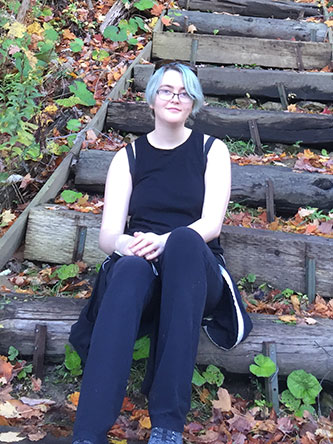Kay McCallum '17

Kay McCallum '17
Graduate Student, Department of Chemistry and Chemical Biology, McMaster University
In what ways do you feel your major in history helped to prepare you for graduate study and/or your current career?
I actually got my graduate research project because of my history degree! My supervisor, Dr. Sarah Styler, first was interested in taking me on as a student because she was impressed with my writing sample – and I owe my writing skills entirely to the many, many essays and writing assignments I was assigned in my history classes. Once she learned I had a background in history, she offered me my current research because it operates at the intersection of art history and environmental chemistry, and I was uniquely suited to work there.
Are you engaged in (historical) research today?
My research is on the application of atmospheric chemistry techniques to art conservation science, which actually involves a significant amount of historical research and knowledge! Whereas conservation scientists look at actual objects, I look at art materials in the lab and try to model what sort of reactions will happen on and to them. But lab-grade or modern materials may not react exactly the same way historic or aged materials do, so understanding and contextualizing the history behind how art was made and what materials were used is critical to getting accurate results.
As an example: one of my projects is on acrylic emulsion paints, which were popularized in the mid-20th century by artists like Andy Warhol. Recently, these mid-century artworks have begun to show damage: a component in the paint exhibits degradation in the presence of light and Titanium White (an inorganic pigment made of the mineral titanium dioxide), which has as-yet unforeseen consequences to the art’s integrity. My work aims to determine how – and how fast – this reaction occurs. However, doing so is a bit more complicated than just buying lab-grade titanium dioxide or Titanium White artist’s pigment and throwing it in a solution and exposing it to light – historically, there have been a couple types of titanium dioxide mineral used to make Titanium White, and these types have different chemical reactivities. Additionally, current Titanium White pigment is not composed of just raw pigment; the particles are coated to improve its lightfastness and reduce its reactivity. I need to understand these historic nuances to provide accurate data that can be applied to real objects outside the lab!
Have you recently published a book, article, or scholarly blog post?
I don’t have any journal publications yet (they’re in preparation at the moment), but last year my work was presented at the Prairie Environmental Chemistry Colloquium in Canada (hosted by the University of Saskatchewan) and at the 2020 Indoor Air Quality in the Museum Environment Workshop (hosted by the Metropolitan Museum of Art).
Which history course or courses were particularly meaningful to you during your time as a BC history major and/or have had a lasting influence? Why?
This is a very hard question, because I want to give a better response than just “all of them!” But as far as impacting my career and educational trajectory, two stand out.
I took Dr. O’Keeffe’s Russian History and Dr. Warren’s Colloquium on Cultural and Intellectual History in the spring semester of 2016, and around the time we began discussing nuclear fears in Dr. Warren’s class, we were reading Plutopia in Dr. O’Keeffe’s. I was very familiar with nuclear chemistry, and here I had the opportunity to examine the historical and environmental impact of chemical concepts I’d only seen in lab or lecture at that point. When I took Environmental Chemistry that fall, I looked at nuclear problems from the opposite end through honors research on the Yucca Mountain nuclear waste storage facility – a modern-day environmental chemistry issue that can only be understood through the history of nuclear waste in the States.
I pursued a year-long independent research project in the History Department with Dr. Warren on scientific ethics and the history of the Manhattan Project. The work we scientists do in the lab have real-world impacts, but rarely in a science-focused course of study are those impacts discussed. As a history major, I was able to get the full picture I would’ve missed by just being in chemistry. Quite frankly, being a history major led me to becoming an environmental chemist and science communicator!
Are there any other reflections on your history major or time in the BC History Department that you’d like us to include in your spotlight?
I was blessed with some transcendent opportunities during my history degree (I’ll never forget seeing Hamilton in previews or visiting the Columbia archives and interacting with historical documents!). But being a history major also gave me practical skills and experience I’ve carried through to my work as a chemistry grad student. I rely daily on the research and writing skills I learned in 2001W with Dr. Mancia and the interview skills I learned in US at War with Dr. Napoli, and they’ve become instrumental in how I present my research.
As a science communicator and a researcher in a very interdisciplinary field, I need to present my work in a way that will be accessible to chemists, conservators, students, and the public. The best way I’ve found to connect people with STEM is by telling it as a story – and I learned how to tell a good story, with nuances, context, and perspective, as a history major.






